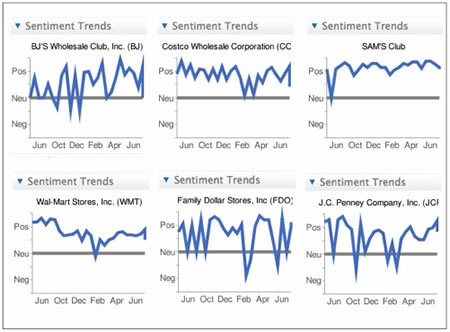Science Fiction
Dictionary
A B C D E F G H I J K L M N O P Q R S T U V W X Y Z
Sentiment Analysis: Hypercorps Need Emotion Chips

Sentiment analysis is a relatively new field that is heating up, thanks to the fascination that big companies have with how we feel about them.
The basic idea is that we betray our feelings as we chat to each other in social media like Twitter and Facebook. Consultants like Newssift download the chatter and then analyze it, and present corporations with graphs like the one below. Is positive sentiment toward your hypercorp waxing or waning? Here are the hard numbers presented to big retailers.

(Sentiment trends for large retailers)
So how does sentiment analysis work?
The simplest algorithms work by scanning keywords to categorize a statement as positive or negative, based on a simple binary analysis (“love” is good, “hate” is bad). But that approach fails to capture the subtleties that bring human language to life: irony, sarcasm, slang and other idiomatic expressions. Reliable sentiment analysis requires parsing many linguistic shades of gray...“We are dealing with sentiment that can be expressed in subtle ways,” said Bo Pang, a researcher at Yahoo who co-wrote “Opinion Mining and Sentiment Analysis,” one of the first academic books on sentiment analysis.
To get at the true intent of a statement, Ms. Pang developed software that looks at several different filters, including polarity (is the statement positive or negative?), intensity (what is the degree of emotion being expressed?) and subjectivity (how partial or impartial is the source?).
(I'm fascinated by the idea that an entirely new science of computer analysis is needed to find out how we consumers feel about companies that promise one thing and deliver another.
Large corporations (or hypercorps, to use John Brunner's word for them from The Shockwave Rider) could easily find out specific facts about their services that consumers do not like. For example, AT&T can read a variety of factual criticisms about their iPhone service in a number of recent tech site blog posts.
However, it is costly to track actual problems with services, and then fix them. Hypercorps like AT&T spend billions honing their brand images, which is just a phrase referring to how we feel about them. If they can track how we feel about them, and then fix how we feel, then the problem is solved.
The service may still suck, but as long as customers don't feel like leaving, it's just as good as actually providing a good service, and much cheaper.)
Anyway, the idea that computer systems might one day learn to interpret the vagaries of human feelings has a long history in science fiction. I'm sure that there are a lot of people who remember that Star Trek: The Next Generation's Commander Data made use of an emotion chip to actually feel emotions himself, which helped him understand his human coworkers and friends.

(Geordi and Data regard the emotion chp)
(Apparently, I'm not yet finished with my feelings about AT&T. Instead of using sentiment analysis to understand how consumers feel about paying 20 bucks per month for the EDGE network, which doles out web pages like Ebenezer Scrooge hands out lumps of coal, AT&T execs could just try using it themselves and then they could feel what we feel directly.)
If you'd like to read an informative article about sentiment analysis that is free from parenthetical ranting, visit NYTimes.com, and you might sift through the informative blog posts on Newssift.
Scroll down for more stories in the same category. (Story submitted 8/25/2009)
Follow this kind of news @Technovelgy.| Email | RSS | Blog It | Stumble | del.icio.us | Digg | Reddit |
Would
you like to contribute a story tip?
It's easy:
Get the URL of the story, and the related sf author, and add
it here.
Comment/Join discussion ( 0 )
Related News Stories - (" Computer ")
Cortex 1 - Today A Warehouse, Tomorrow A Calculator Planet
'There were cubic miles of it, and it glistened like a silvery Christmas tree...' - Clifford Simak, 1949.
Is Agentic AI The Wrong Kind Of Smartness?
'It’s smart enough to go wrong in very complicated ways, but not smart enough to help us find out what’s wrong.' - Isaac Asimov, 1975.
Jetson Orin Nano Super 70 Just $249
'Rayno folded up the microterm and tucked it back inside his jumper.' - Bruce Bethke, 1983.
Automatic Bot Traffic Is 38 Percent Of HTTP Requests
'there were so many worms and counterworms loose in the data-net...' - John Brunner, 1975
Technovelgy (that's tech-novel-gee!) is devoted to the creative science inventions and ideas of sf authors. Look for the Invention Category that interests you, the Glossary, the Invention Timeline, or see what's New.
Science Fiction
Timeline
1600-1899
1900-1939
1940's 1950's
1960's 1970's
1980's 1990's
2000's 2010's
Current News
The New Habitable Zones Include Asimov's Ribbon Worlds
'...there's a narrow belt where the climate is moderate.'
Can One Robot Do Many Tasks?
'... with the Master-operator all you have to do is push one! A remarkable achievement!'
Atlas Robot Makes Uncomfortable Movements
'Not like me. A T-1000, advanced prototype. A mimetic poly-alloy. Liquid metal.'
Boring Company Drills Asimov's Single Vehicle Tunnels
'It was riddled with holes that were the mouths of tunnels.'
Humanoid Robots Tickle The Ivories
'The massive feet working the pedals, arms and hands flashing and glinting...'
A Remarkable Coincidence
'There is a philosophical problem of some difficulty here...'
Cortex 1 - Today A Warehouse, Tomorrow A Calculator Planet
'There were cubic miles of it, and it glistened like a silvery Christmas tree...'
Perching Ambush Drones
'On the chest of drawers something was perched.'
Leader-Follower Autonomous Vehicle Technology
'Jason had been guiding the caravan of cars as usual...'
Golf Ball Test Robot Wears Them Out
"The robot solemnly hit a ball against the wall, picked it up and teed it, hit it again, over and again...'
Boring Company Vegas Loop Like Asimov Said
'There was a wall ahead... It was riddled with holes that were the mouths of tunnels.'
Rigid Metallic Clothing From Science Fiction To You
'...support the interior human structure against Jupiter’s pull.'
Is The Seattle Ultrasonics C-200 A Heinlein Vibroblade?
'It ain't a vibroblade. It's steel. Messy.'
Roborock Saros Z70 Is A Robot Vacuum With An Arm
'Anything larger than a BB shot it picked up and placed in a tray...'
A Beautiful Visualization Of Compact Food
'The German chemists have discovered how to supply the needed elements in compact, undiluted form...'
Bone-Building Drug Evenity Approved
'Compounds devised by the biochemists for the rapid building of bone...'
